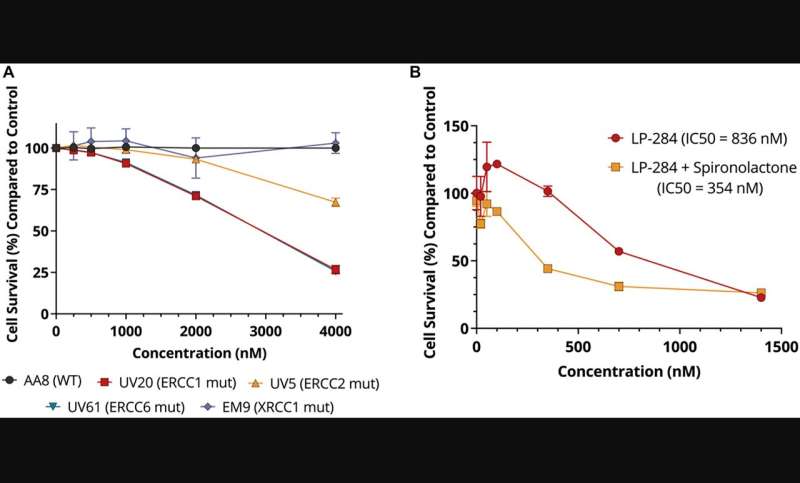This article has been reviewed according to Science X's editorial process and policies. Editors have highlighted the following attributes while ensuring the content's credibility:
fact-checked
peer-reviewed publication
proofread
LP-284 targets non-Hodgkin's lymphoma and DNA damage repair deficiency

A new research paper titled "LP-284, a small molecule acylfulvene, exerts potent antitumor activity in preclinical non-Hodgkin's lymphoma models and in cells deficient in DNA damage repair" has been published in Oncotarget.
Despite advances in therapies treating non-Hodgkin's lymphoma (NHL), 20~40% of patients experience relapsed or refractory disease. While solid tumors with homologous recombination deficiencies have been successfully targeted with synthetic lethal agents such as poly-ADP ribose polymerase (PARP) inhibitors, such synthetic lethality strategy has not yet been approved to treat patients with NHL.
In this new study, researchers Jianli Zhou, Drew Sturtevant, Cassie Love, Aditya Kulkarni, Neha Biyani, Umesh Kathad, Elizabeth Thacker, Sandeep Dave, and Kishor Bhatia from Lantern Pharma Inc., Duke University and Data Driven Bioscience investigated the mechanism of action (MoA) and therapeutic potential of a new-generation acylfulvene compound, LP-284, in both in vitro and in vivo NHL models.
"Here, we aimed to characterize LP-284's antitumor efficacy in NHL models and further elucidate its mechanisms of action," explain the researchers.
One of LP-284's MoA includes inducing the repair of double-strand DNA break (DSB). The researchers found that LP-284 exerts nanomolar potency in a panel of hematological cancer cell lines including fifteen NHL cell lines. In vivo, LP-284 treatment prolongs the survival of mantle cell lymphoma (MCL) cell line JeKo-1 derived xenograft mice by two-fold and shows increased efficacy over bortezomib and ibrutinib. In addition, LP-284 is capable of inhibiting tumor growth of JeKo-1 xenografts that are refractory to bortezomib or ibrutinib. They further showed that LP-284 is particularly lethal in cells with deficient DNA damage response and repair, a targetable vulnerability in NHL.
The researchers add, "In conclusion, our study has demonstrated LP-284 as a novel and potent acylfulvene drug that can suppress tumor growth in NHL models and cells with HR or TC-NER deficiency."
More information: Jianli Zhou et al, LP-284, a small molecule acylfulvene, exerts potent antitumor activity in preclinical non-Hodgkin's lymphoma models and in cells deficient in DNA damage repair, Oncotarget (2023). DOI: 10.18632/oncotarget.28454




















